- Anthony D'Amico
- Albums and Singles
 Discovering this London-based composer's adventurously psychedelic collages of traditional Greek music was one of 2021's great musical pleasures for me, so I was very eager to hear this ambitious double album follow up to Antiqua Graecia. As expected, it is a characteristically wonderful and unusual release, but it is also marks a detour away from Stamou's impressive run of Greek-themed albums. The theme of the aptly titled Monoliths is instead Stamou's attempt to "collide" the two sides of his working methods: live performances and studio work. By my estimation, it was a very successful collision, but it was mostly a behind-the-scenes one, as I would be hard pressed to determine where one approach starts and another begins. As a result, the more immediate and striking theme of the album for me as a listener is that each piece feels like an extended experiment in crafting an immersive, complexly layered sound world from just a single recognizable instrument. At least, that is how Monoliths unfolds for its first half, as the bottom drops out of the album's hallucinatory feast of bells, organs, and steel drums to reveal a considerably more processed, abstract, and psychotropic second hour of drone-damaged mindfuckery. That approach admittedly makes Monoliths a bit less accessible than some of Stamou’s more conventionally melodic work, but serious heads looking for a deep and sustained dive into otherworldly psych meditations will likely love this immersive tour de force.
Discovering this London-based composer's adventurously psychedelic collages of traditional Greek music was one of 2021's great musical pleasures for me, so I was very eager to hear this ambitious double album follow up to Antiqua Graecia. As expected, it is a characteristically wonderful and unusual release, but it is also marks a detour away from Stamou's impressive run of Greek-themed albums. The theme of the aptly titled Monoliths is instead Stamou's attempt to "collide" the two sides of his working methods: live performances and studio work. By my estimation, it was a very successful collision, but it was mostly a behind-the-scenes one, as I would be hard pressed to determine where one approach starts and another begins. As a result, the more immediate and striking theme of the album for me as a listener is that each piece feels like an extended experiment in crafting an immersive, complexly layered sound world from just a single recognizable instrument. At least, that is how Monoliths unfolds for its first half, as the bottom drops out of the album's hallucinatory feast of bells, organs, and steel drums to reveal a considerably more processed, abstract, and psychotropic second hour of drone-damaged mindfuckery. That approach admittedly makes Monoliths a bit less accessible than some of Stamou’s more conventionally melodic work, but serious heads looking for a deep and sustained dive into otherworldly psych meditations will likely love this immersive tour de force.
The opening "Bells Drone" sounds deceptively like it could be layered field recordings of wind chimes at first, as bells of different sizes amiably jangle and clang for couple minutes before any real evidence of Stamou's hand starts to emerge. Soon, however, some tones start to linger supernaturally and the mood darkens into uneasy shadows of dissonance. It is quite a wonderfully hallucinatory and entrancing piece, evoking an ancient ritual in a cavernous subterranean temple revealed behind a dissolving reality. While it is the shortest piece on the album at a mere 13 minutes, it is nevertheless a solid representation of the album’s first half: a simple and minimal theme gradually transforms into a vividly multi-dimensional dream world. On "Chord Organ #2," for example, an organ drone slowly evolves into a Catherine Christer Hennix-esque nightmare of dark harmonies before unexpectedly resolving on a note of sundappled transcendence. "Steel Drum Drone," on the other hand, steadily becomes something akin to a lovesick tropical Steve Reich. That one is another favorite, as I am quite impressed with how Tasos weaves together patterns of plinking and bleary steel drum melodies into a thing of woozy multi-layered beauty.  In fact, I love every single one of the opening three pieces, but they turn out to be a mere prelude to two pieces in which Tamou goes totally bananas. In the first, "Supernormal," Stamou mingles a chirping electronic drone with squealing and sliding strings en route to an harrowing mindfuck that calls to mind a goddamn demon summoning (the final stretch of oscillating synth thrum is especially choice). The closing "Synapse" improbably features some even more gnarly sounds, passing though such colorful stages like "menacingly gelatinous bass throb," "an undead gamelan ensemble wanders the deserted streets in search of their next victim," and "a simmering and intense prepared piano performance over quasi-industrial rhythmic loops." This is an absolute feast of an album: five great longform pieces in a row spanning nearly two hours. Most days, I admittedly prefer the more meditative/ritualistic first half to the more nightmarish second half, but Stamou was swinging for the fences with every single piece on this album and the result is a monolithically stellar release.
Samples can be found here.
Read More
- Anthony D'Amico
- Albums and Singles
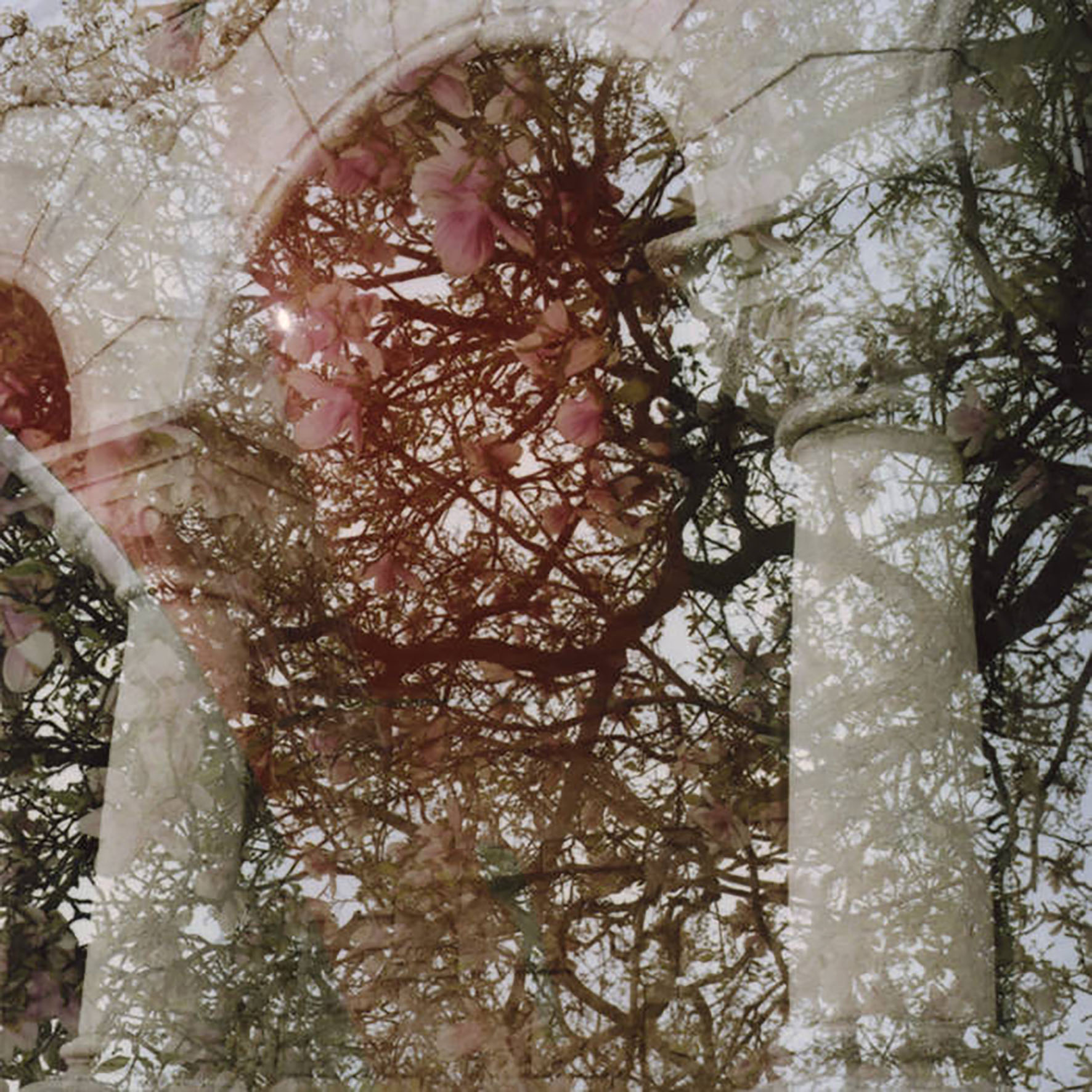 This lovely and unexpected collaboration was quietly released digitally in November with no background information provided at all, but it is probably safe to say that it was recorded quite recently, as it shares a lot of common ground with the radiant drones of Growing's Diptych (2021). That, of course, also means that Gainer can sometimes feel like a welcome throwback to "classic Kranky" era drone artists like Stars of the Lid, though each piece ultimately blossoms into something more ambitious and distinctive by the end. That drone-heavy aesthetic sometimes makes figuring out where Lattimore fits in quite a challenge, as recognizable harp sounds are a bit of a rarity amidst the smoldering bass thrum and ambient shimmer. Then again, recognizable guitar and bass sounds are not exactly rampant either, so maybe all three artists opted for elegantly blurred impressionist abstraction. In any case, whatever they did worked quite well, as Lattimore and Growing's two aesthetics bleed together quite nicely and often feel like something greater than the mere sum of their parts (or at least like a very good Growing album beautifully enhanced with subtle acoustic shadings and flickers of melody).
This lovely and unexpected collaboration was quietly released digitally in November with no background information provided at all, but it is probably safe to say that it was recorded quite recently, as it shares a lot of common ground with the radiant drones of Growing's Diptych (2021). That, of course, also means that Gainer can sometimes feel like a welcome throwback to "classic Kranky" era drone artists like Stars of the Lid, though each piece ultimately blossoms into something more ambitious and distinctive by the end. That drone-heavy aesthetic sometimes makes figuring out where Lattimore fits in quite a challenge, as recognizable harp sounds are a bit of a rarity amidst the smoldering bass thrum and ambient shimmer. Then again, recognizable guitar and bass sounds are not exactly rampant either, so maybe all three artists opted for elegantly blurred impressionist abstraction. In any case, whatever they did worked quite well, as Lattimore and Growing's two aesthetics bleed together quite nicely and often feel like something greater than the mere sum of their parts (or at least like a very good Growing album beautifully enhanced with subtle acoustic shadings and flickers of melody).
The album is divided into two longform pieces that each clock in around 16 or 17 minutes. The opening "Flowers in the Center Lane Sway" fades quietly into being with a slow melody of harmonic-like swells. Around the 2-minute mark, however, the piece unexpectedly blossoms into a far more harmonically and texturally rich chord progression. Given that this partially a Growing album, there is a healthy amount of amplifier hum and buzzing drone waves as well, which provides a pleasantly bleary and immersive backdrop for a simple, seesawing melody that evokes the faint streaks of light from the final moments of a vivid sunset. Occasionally, there is a hint of audible harp or the sensation of something harp-like moving amidst the hum, but Lattimore finally appears in earnest for the piece's final third to add rippling and ephemeral arpeggios that feel like glimpses of twinkling stars in the gaps between passing clouds. As all that happens, the piece sneakily accumulates a pleasantly heaving and hypnotic pulse as well, which is a damn neat trick. It is solid piece, but the following "Tagada, Night Rises" is both stronger and more distinctive. Lattimore initially seems to be steering the ship for the piece, as quivering webs of arpeggios streak lazy trails across a smoldering backdrop of bass drone. Rather than feeling like it is evolving toward something larger, however, the piece lingers in a warm and glimmering dreamscape akin to a state of suspended animation (though the bass drone does seem to be stealthily building in intensity throughout the piece). "Tagada" takes a surprise detour around the halfway point though, as it feels like a menacing vibrato has curdled the bass drone and cast a shadow of uneasy dissonance across everything. That darkening paves the way for yet another composition trick, however, as the piece slowly brightens for a warmly lovely crescendo of woozy and quavering guitar and harp motifs before ending with unexpectedly gorgeous outro that feels like dark birds silhouetted by a deep red sunset. While I suspect both pieces will resonate more with fans of Growing's dronier side than with Lattimore's own fanbase, Gainer is both an impressively organic/seamless convergence of visions and a sustained, quietly beautiful reverie.
Samples can be found here.
Read More
- Anthony D'Amico
- Albums and Singles
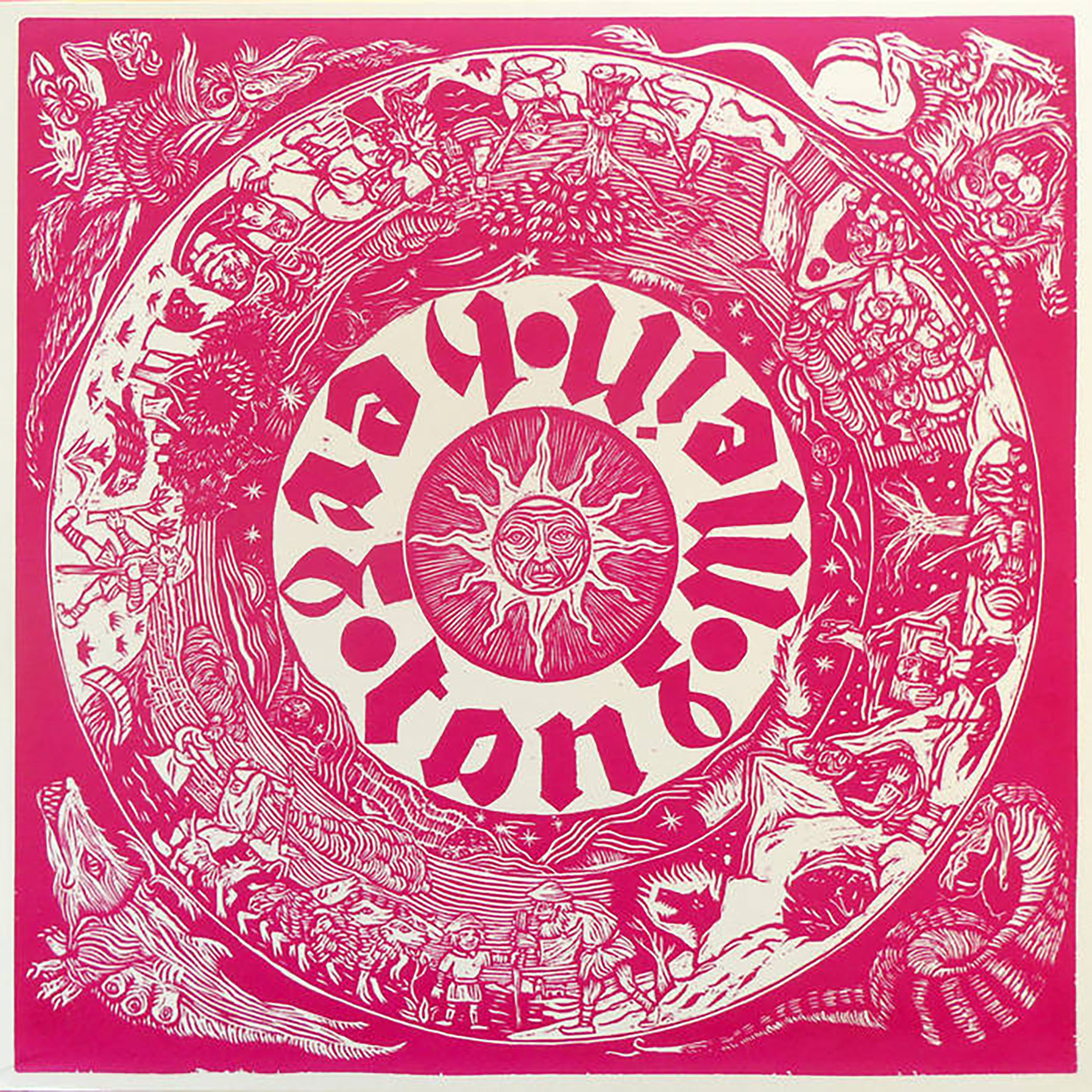 I began 2021 not knowing a single goddamn thing about Jeremie Sauvage, the Standard In-Fi label, or France's fascinating Auvergnat/avant-folk milieu, but I am certainly ending the year as a somewhat obsessed fan. Weirdly, this year was not an especially prolific year for the milieu, though Yann Gourdon and Sourdure had fresh releases, yet this album, the Sourdure album, and a pair of France reissues seemed to reach a lot more ears than usual and two of those ears were mine. The linguistically astute may successfully deduce that Quattro is Tanz Mein Herz's fourth album, but details beyond that are minimal and the recordings actually date from a two-day "public recording session" back in 2016 (the band's entire discography seems to have been recorded between 2014 and 2016, in fact). There is also some poetic information provided in French that makes repeated references to drones, vibrations, resonance, infinity, suspension, immensity, and a "pendulum of dreams," which I found both apt and predictably alluring. Admittedly, many of those descriptors could also apply to a host of disappointing drone albums, but I suspect the "pendulum of dreams" bit is probably the secret ingredient that makes this particular album so transcendent. That said, Quattro can also be quite challenging at times, but it unquestionably captures a very unusual acoustic drone ensemble at the very height of their eclectic and hypnotic powers, so it invariably winds up somewhere compelling no matter how prickly the voyage may become along the way.
I began 2021 not knowing a single goddamn thing about Jeremie Sauvage, the Standard In-Fi label, or France's fascinating Auvergnat/avant-folk milieu, but I am certainly ending the year as a somewhat obsessed fan. Weirdly, this year was not an especially prolific year for the milieu, though Yann Gourdon and Sourdure had fresh releases, yet this album, the Sourdure album, and a pair of France reissues seemed to reach a lot more ears than usual and two of those ears were mine. The linguistically astute may successfully deduce that Quattro is Tanz Mein Herz's fourth album, but details beyond that are minimal and the recordings actually date from a two-day "public recording session" back in 2016 (the band's entire discography seems to have been recorded between 2014 and 2016, in fact). There is also some poetic information provided in French that makes repeated references to drones, vibrations, resonance, infinity, suspension, immensity, and a "pendulum of dreams," which I found both apt and predictably alluring. Admittedly, many of those descriptors could also apply to a host of disappointing drone albums, but I suspect the "pendulum of dreams" bit is probably the secret ingredient that makes this particular album so transcendent. That said, Quattro can also be quite challenging at times, but it unquestionably captures a very unusual acoustic drone ensemble at the very height of their eclectic and hypnotic powers, so it invariably winds up somewhere compelling no matter how prickly the voyage may become along the way.
I am not sure how constant Tanz Mein Herz's line-up is (or was), but at the time of the Quattro sessions they were a seven-piece ensemble and damn near everyone involved has ties to some other notable project (France, Toad, Sourdure, La Baracande, Faune, Omertà, etc.). I suppose that makes this project some kind of fitfully convening all-star team that brings together all the best threads of a flourishing scene, which seems to unexpectedly be a winning formula these days if one also considers Enhet För Fri Musik. In any case, Quattro consists of six pieces that stretch across four sides of vinyl and most of them are quite long (even the shortest piece ("Outro") clocks in at over seven minutes). In a surprise twist, my favorite piece is among the album's shorter ones, as "Tales From the Middle of the Night" crams a hell of a lot of brilliance into just over ten minutes. The piece is built upon a repeating marimba-like melody and heavy buzzing drones, but it does not take long before it blossoms into a mind-bending phantasia of sliding, smeared, and howling strings that calls to mind La Monte Young’s Theatre of Eternal Music trying their hand at exotica (yet another winning formula, for those keeping score). As it unfolds, however, it only gets improbably better and better and burrows deeper into my mind, which is exactly what I want from psychotropic drone (and I would be hard pressed to think of anyone else who does it quite this well).
Remarkably, the only real difference between that highlight and the rest of the album is merely that the other pieces simply take a bit longer to truly catch fire. For example, the 20-minute "Magical Stones and Shiny Mud" starts off on a somewhat unpromising cacophony of bagpipe-y drones and flutes, then detours into a radiant and languorous drone-rock groove. I initially suspected I would not be able to connect with it at all, but then the final five minutes darken into a killer drone rock finale that seamlessly incorporates space rock, dub, and Eastern-tinged melodies. In a perfect world, it would admittedly not have taken fifteen minutes to get to that payoff, but the important thing is that they eventually got there and that it is quite wonderful once it happens. And there is certainly not anyone else who is doing the same thing in more impressive fashion, so I am happy to experience Tanz Mein Herz's singular vision in whatever goddamn shape they feel like presenting it in. Elsewhere, "Spiegel Haus” has a more promising and exotic-sounding central theme, but otherwise follows a similar trajectory, as the band pleasantly treads water in an Amon Düül II-style communal jam vein before eventually erupting in roiling cacophony of bubbling, spacey electronics and howling guitars. The following "96" is a bit more focused, as a looping bass hook steadily builds into a jangling and howling nightmare of sharp drones and ugly harmonies, while the minimal "Alor" sounds like drones from an ancient war horn or something that Yoshi Wada might have built. Given that, it is safe to say that Quattro is a seriously ambitious and oft-"difficult" album, which may throw some listeners who are less forgiving of extended durations and long, slow build ups or those less attuned to Wada-esque dissonance. For those who are unfazed by such rough edges, however, Quattro will likely feel like an absolute godsend, as it beautifully channels the late ‘60s glory days when Eastern drones, freeform improvisation, and heavy psychedelia converged in spectacular fashion (and it throws in some welcome new twists as well).
Samples can be found here.
Read More
- Anthony D'Amico
- Albums and Singles
 Klara Lewis has been a unique and consistently interesting artist ever since she first surfaced, but 2020's Ingrid felt like a massive breakthrough and just about everything that she has released since has been stellar (live albums included). Unsurprisingly, Live in Montreal 2018 does nothing to derail that streak, but there are a couple of somewhat big surprises with it too. The first one is the date of the performance, as I had no idea that Lewis was on this plane two years before Ingrid came along. That is not to say that Live in Montreal would have necessarily eclipsed 2016's excellent Too had it been the follow up, but the Lewis of 2016 was an artist who seemed categorically disinterested in doing anything the conventional/expected way. And the comparative melodicism of 2018's fitfully great collaboration with Simon Fisher Turner (Care) felt like a one-off experiment in applying her non-musical found sounds to a more traditionally musical vision rather than a change in direction. As it turns out, however, Care was merely a tease of greater things to come and the lucky attendees of this performance got a sneak preview of those greater things long before the rest of us. The second big surprise is that this album is composed of seemingly all new material rather than variations on Lewis's existing work—it feels aesthetically akin to a proto-Ingrid, but a stage before that piece was distilled to just a single perfect motif. Obviously, that narrowing of focus yielded great results, but this more varied and shapeshifting approach yielded some legitimately great results too, elegantly blurring the lines between drone, noise, spacy synth explorations, and pop plunderphonics.
Klara Lewis has been a unique and consistently interesting artist ever since she first surfaced, but 2020's Ingrid felt like a massive breakthrough and just about everything that she has released since has been stellar (live albums included). Unsurprisingly, Live in Montreal 2018 does nothing to derail that streak, but there are a couple of somewhat big surprises with it too. The first one is the date of the performance, as I had no idea that Lewis was on this plane two years before Ingrid came along. That is not to say that Live in Montreal would have necessarily eclipsed 2016's excellent Too had it been the follow up, but the Lewis of 2016 was an artist who seemed categorically disinterested in doing anything the conventional/expected way. And the comparative melodicism of 2018's fitfully great collaboration with Simon Fisher Turner (Care) felt like a one-off experiment in applying her non-musical found sounds to a more traditionally musical vision rather than a change in direction. As it turns out, however, Care was merely a tease of greater things to come and the lucky attendees of this performance got a sneak preview of those greater things long before the rest of us. The second big surprise is that this album is composed of seemingly all new material rather than variations on Lewis's existing work—it feels aesthetically akin to a proto-Ingrid, but a stage before that piece was distilled to just a single perfect motif. Obviously, that narrowing of focus yielded great results, but this more varied and shapeshifting approach yielded some legitimately great results too, elegantly blurring the lines between drone, noise, spacy synth explorations, and pop plunderphonics.
As with a lot of live albums these days, the only significant difference in sound quality between Live in Montreal and one of Lewis's more formal recordings is that it feels like there is a thin veil between me and the full harmonic richness, clarity, and crunching physicality of the music. Obviously, that is less than ideal, but that loss is presumably offset by a more significant gain like "it was not possible to reproduce the magic and spontaneity of this performance in a studio." In any case, this album consists of a single 47-minute piece "with three distinct discernible sections" and an overarching theme of "permanent collapse" in which "strange sonic elements introduce themselves, rise to the fore, threaten the fundamental discourse only to recede on the brink of destroying the work itself." While I sometimes have a hard time determining which elements constitute "the work" and which ones are the threatening interlopers as the piece unfolds, the trajectory of the opening section is quite easy to grasp: an intense choral sample plays over a subdued, gurgling, and crackling industrial rhythm, becomes erratic, then settles into a looping and haunted-sounding melody just as a visceral assault of white noise erupts. In a rough sense, it resembles a killer noise set tenaciously trying to tear its way through a classical requiem with only moderate success, which is a very appealing aesthetic given the fine balance of beauty and violence that Lewis achieves.
I am not sure if the noise element necessarily wins in the end, but the original choral theme is eventually reduced to a bleary drone augmented by woodland sounds like chattering birds while the noise/industrial elements rhythmically continue onward to steer the piece into a fresh passage of flanging drones over a heaving, crunching sea of roiling white noise. Gradually, however, it starts to feel like me and my chirping avian buddies are now at the seaside (along with some quivering feedback ghosts) as large waves relentlessly crash upon the shore, yet that too proves to be an ephemeral interlude, as Lewis soon starts to segue into her next dazzling set piece. While the next section could reasonably be described as "warm ambient drones," they are vividly enhanced by a shapeshifting host of dissolving and hallucinatory new elements (hiss, submerged backwards melodies, glimpses of Spanish guitar, Whitney Houston belting out (nearly) unrecognizable fragments of "I Will Always Love You," etc.). All of those other elements gradually vanish, however, leaving a gorgeously psychotropic and crystalline drone palace in their wake. For her final trick, Lewis ends the pieces with frayed, shivering synth swells that spectrally wobble over a stark backdrop of crackling textures. It is an appropriately beautiful conclusion to the set, but Lewis's more impressive achievement is how organically fluid and compelling the journey to get there was: this album flows along wonderfully and the bridges between its major events never lull, nor does it ever feel like Lewis artfully stitched together a trio of different pieces into one. There is a definite arc to this album and it is a thoughtful and satisfying one with no missteps or unnecessary detours to be found. While live albums outside the improv/jazz milieu are historically not my favorite thing, this one is a rare and notable exception, easily ranking among the finest releases in Lewis's already impressive discography.
Samples can be found here.
Read More
- Duncan Edwards
- Albums and Singles
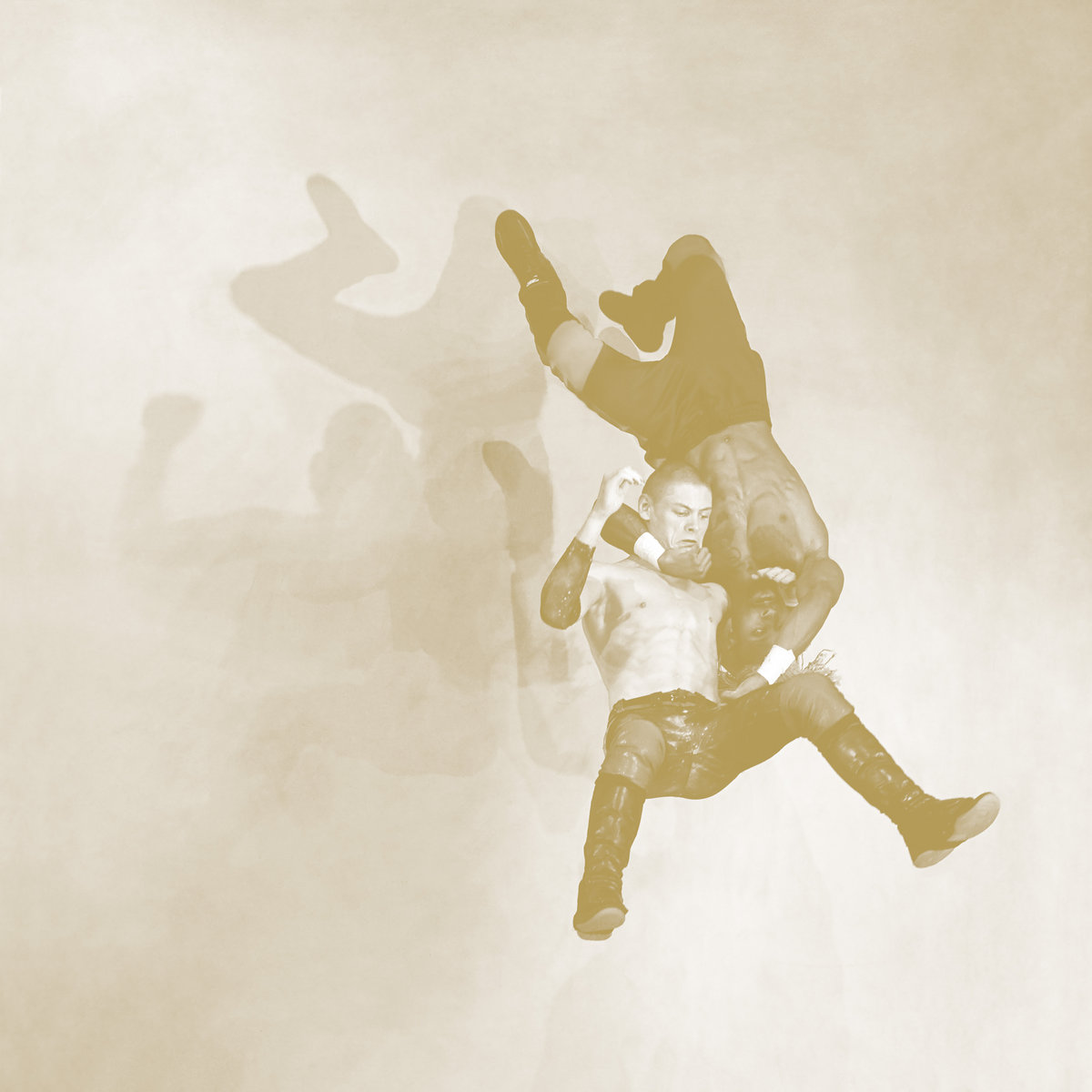 I don’t know exactly what synth-like equipment Robert Takahashi Crouch uses to generate these sounds and maneuver them into place, but these three pieces are very impressive. This is an album of abstract music and it is useful for reference to have detailed context of Crouch's personal challenges and struggle as outsider, victim, self-destructor, or whatever. I read those between my first and second listens to Jubilee and it definitely helped.
I don’t know exactly what synth-like equipment Robert Takahashi Crouch uses to generate these sounds and maneuver them into place, but these three pieces are very impressive. This is an album of abstract music and it is useful for reference to have detailed context of Crouch's personal challenges and struggle as outsider, victim, self-destructor, or whatever. I read those between my first and second listens to Jubilee and it definitely helped.
The opening track "Ritual" has a tense vibe and a sense of emotional heavy lifting is achieved by huge slabs of grinding, vibrating, texture, which emerge and then blend or get overlaid like shifting tectonic plates of sound. There is a weird feeling of aggression, but this feels turned inward rather than aimed at the listener. I felt involved with the music but it also came over as both detached and claustrophobic. An odd pair of descriptors, perhaps, but I hear Jubilee not unlike how I see the doomed grey void of the Rothko Chapel: it drew me in but kept me at arms length). According to Crouch's contextual notes, the next track “I have been part of evil doing” is an acknowledgement that even the abused may do "bad" things to others which they come to regret. This shorter work, which takes it’s title from “People Like Us” a 2007 record by The Dears, has a calmer, gentler, softer, air - an excellent variation against the weightier “Ritual.” This quite lighter mood leads perfectly into “Reconciliation” which is just as beautiful. This final track begins with the recounting of a survived bridge suicide attempt in a sample from a poem by Ted Berrigan from the 1975 record The Dial-a-Poem Poets: Biting Off The Tongue of a Corpse. The placement of a human voice here is another fine contrast, and the somber tone and graceful pace of "Reconciliation" succeeds in uniting the whole album with a powerful renewal of hope and forgiveness (especially the latter). The three sections together make Jubilee a really coherent and satisfying recording, located betwixt sound installation art and electronic expressionism, with an emotional edge that gives it a tangible feeling of integrity and maybe even hope for personal growth.
This is a fine album which I would prefer to listen to again than revisit the Rothko chapel (though I love Rothko's other works). In fact I have already heard Jubilee six or seven times, despite the title being a reference to a work by the so-called anarchist poet (with a trust fund) Hakim Bey to whose writing I have a strong aversion. To call him a juvenile imitation of William Burroughs would be flattery. It is certainly possible to view him as an incoherent creep, spinning deceitful tips for weekend rebels or oozing his pitiful justifications for pedophilia like puss from an open wound. It is debatable whether his blather is worse than the illogical, pseudo-freedom loving gasbag rambles of Ron and Rand Paul when they butter-up their constituents with easily-decoded defenses of racism. I personally can't stomach a message of forgiveness from any of them and the fact that Andrei Codrescu got suckered into feting Bey also does nothing for my digestion. Thankfully all this is merely a matter of opinion, perhaps worthless, certainly available free on the internet as is the entirety of Bey's writing. Crouch's record is worth more.
 
Read More
- Anthony D'Amico
- Albums and Singles
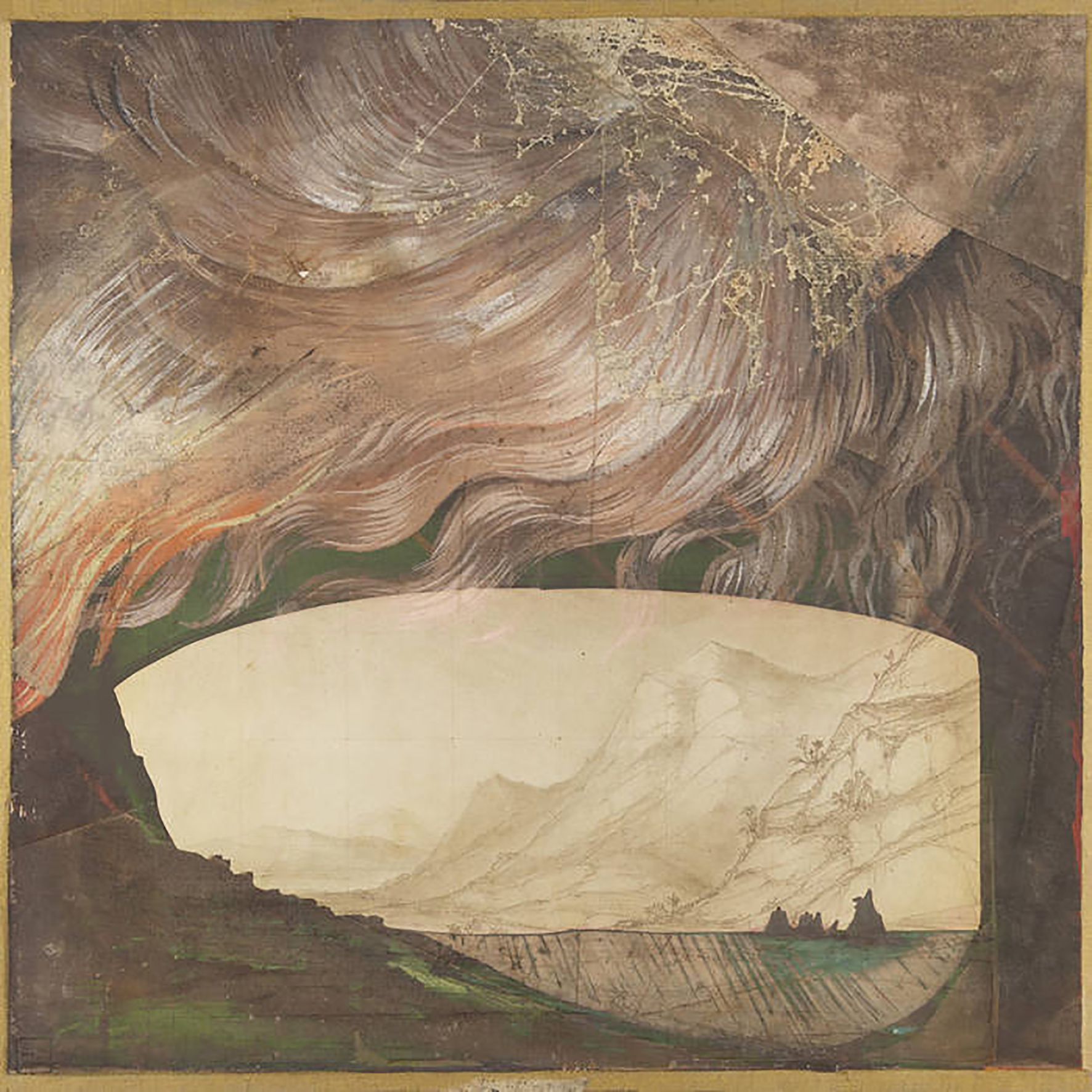
Released back in the spring, this debut full-length from cryptically named Belgian composer 't Geruis has gradually blossomed into my favorite Lost Tribe Sound release not made by William Ryan Fritch or Andy Cartwright. According to the composer, Various Thoughts and Places is "an exercise in finding the balance between beauty and what is broken," which is a concise and poetic way of saying that this album shares a healthy amount of common ground with the more sublime side of tape loop artists such as Craig Tattersall and Andrew Hargreaves. Admittedly, few stylistic niches scream "Anthony D'Amico will like this” more than that one, but this album is also unexpectedly psychotropic and otherworldly in a way that is quite unique to 't Geruis. My best stab at describing that vision is that Various Thoughts and Places sounds like it was crafted from a handful of fragments of gorgeous and impressionistic-leaning classical albums and enhanced with strangled animal-like howls (I think there may also be a cannibalized pop song that I cannot place lurking in there too). Moreover, the execution is absolutely transcendent. Anyone looking for a slow-burning and immersive phantasmagoria of hissing loops and tenderly bittersweet melodies can basically begin and end their search here, as it is damn near impossible to imagine anyone surpassing this modest masterpiece once it hits its stride.
The opening "Tree Weeping (Lacrima)" nicely sets the gently hallucinatory mood with a one-finger piano melody wandering through a landscape of subtle string drones, crackle, and hiss before blossoming into a lovely and bittersweet violin melody. In a rough sense, both the opener and the album as a whole could be described as "classical-adjacent," as the primary building blocks are simple piano and string melodies, but the album starts to feel considerably more unique and inspired with the third piece ("Een Deur Ergens In De Vallei"), as the full depth of 't Geruis's vision starts to quietly reveal itself. It evokes a flickering, slow motion silent film accompanied by a crackling supernatural Victrola that imbues every sound with a dreamlike melancholia that feels gnawed, vulnerable, and lovesick. From that point onward, the album settles into a sustained run of absolutely beautiful pieces that makes it clear that 't Geruis is probably some kind of textural genius/master loop architect. On "Where Birds Resonate," for example, a simple plinking melody gradually starts tumbling into itself while a cricket-like textural backdrop hypnotically pulses and pans in see-sawing fashion, while "Le Cadeau d'Alice" calls to mind the gossamer folktronica of early Colleen enhanced with a corroded-sounding bass loop that feels half "industrial" and half "slowly heaving cosmic exhalation."
Elsewhere, "Rendit l'Âme" uses a simple, pretty piano loop as the backdrop from a gnarled, warbling melody that sounds like it is struggling to emerge from the spirit realm. There is a definite "séance" vibe to the piece, but it also feels more visceral than that, as if 't Geruis built a homemade microphone that could pick up the sadness of eternity and that it manifested itself as a loop of tape-ravaged, heartbroken moans. Despite that, the piece and the album are not particularly dark one on their surface, as the central focus is almost always on light, lovely melodies rather than brooding atmospheres—the melodies just happen to be corroded, crackling, and hiss-chewed to such a degree that they always feel haunted and otherworldly. I suppose I would be remiss if I did not also mention that "Wanneer Alles Even Stil Staat" and "De Waarnemer" are highlights as well, but the album feels like a series of elegant variations on the same themes and its true magic lies in the sustained and beautiful spell that it casts as a whole. At its best, Various Thoughts and Places scratches roughly the same itch as some other contemporary tape music melancholia luminaries (always welcome territory), yet it also feels like it is being somehow channeled from an earlier century, which is quite a neat trick (and a tough illusion to sustain). While it admittedly took me a few listens before the full beauty of 't Geruis's vision began to fully bleed into my consciousness, I certainly got there eventually and this has since become one of my favorite releases of the year.
Samples can be found here.
Read More
- Anthony D'Amico
- Albums and Singles
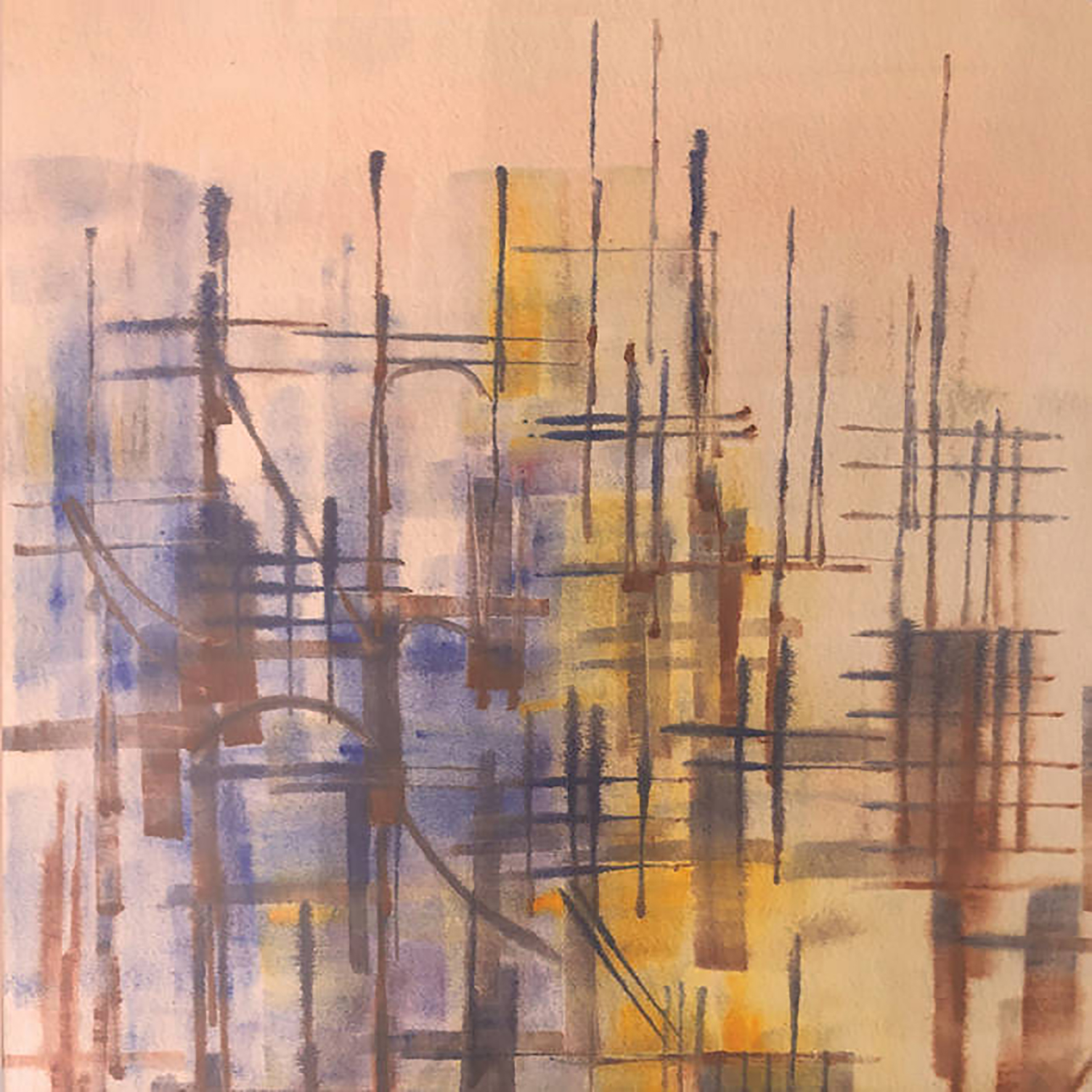 As far as I am concerned, Konstantinos Soublis earned a lifetime pass as dub techno royalty with his early Chain Reaction work (the likes of which enjoyed a well-deserved renaissance when Type reissued Vibrant Forms in 2013). Much like fellow visionary Moritz von Oswald, however, Soublis has a creatively restless spirit that has led him in a number of different directions since that scene's late '90s/early '00s golden age came to an end. While I cannot say that I have been a fan of all of Fluxion's various detours over the years, Soublis's unpredictably hit-or-miss discography has continued to surprise me with a legitimate hit every few years. In fact, Fluxion has been in unusually fine form recently and that upswing seems to have culminated in this album, which is unexpectedly one of the most uniformly strong and inspired releases in the project's entire oeuvre. Part of that success is likely due to Soublis's decision to take his vision in a more intimate and inwardly inspired direction (the album was inspired by "real life moments, people, expectations, joy, dreams and disappointments"), but the primary appeal of Parallel Moves is that his new inspirations manifested themselves in quite a killer batch of unusually sensual, soulful, and melodic songs. To my ears, this is a very strong contender for the best Fluxion album ever released.
As far as I am concerned, Konstantinos Soublis earned a lifetime pass as dub techno royalty with his early Chain Reaction work (the likes of which enjoyed a well-deserved renaissance when Type reissued Vibrant Forms in 2013). Much like fellow visionary Moritz von Oswald, however, Soublis has a creatively restless spirit that has led him in a number of different directions since that scene's late '90s/early '00s golden age came to an end. While I cannot say that I have been a fan of all of Fluxion's various detours over the years, Soublis's unpredictably hit-or-miss discography has continued to surprise me with a legitimate hit every few years. In fact, Fluxion has been in unusually fine form recently and that upswing seems to have culminated in this album, which is unexpectedly one of the most uniformly strong and inspired releases in the project's entire oeuvre. Part of that success is likely due to Soublis's decision to take his vision in a more intimate and inwardly inspired direction (the album was inspired by "real life moments, people, expectations, joy, dreams and disappointments"), but the primary appeal of Parallel Moves is that his new inspirations manifested themselves in quite a killer batch of unusually sensual, soulful, and melodic songs. To my ears, this is a very strong contender for the best Fluxion album ever released.
At its core, Parallel Moves still very much feels like a Fluxion album, as the usual dub techno elements are all in place (propulsive grooves, dub-wise production shadings, a fondness for minimalism, and a warm, repeating pulse), but it also feels elevated in a way that is difficult to pin down. I have seen it described as jazz-tinged and "almost balearic," however, and that seems reasonably accurate: it certainly feels breezy and tropical at times, yet is also feels like a lot of other things as well. The deeper transformation seems to lie in the execution rather than the style, as the best songs feel organic, nuanced, and casually effortless in the best way possible. For example, the album’s zenith is "Orange Sky," which is essentially just a stomping, off-kilter beat, a simple two-chord pulse, and some warm, bleary drones, yet the magic lies in the details and the dynamics (finger snaps, flickers of spectral guitar, etc.). Moreover, Soublis somehow makes it all feel effortless. It feels a bit like the heavily reggae-influenced dub techno of Rhythm & Sound, yet this is one of the rare instances where someone can match that celebrated project in quality, as Soublis steers that aesthetic into more sun-dappled territory with impressive lightness of touch and no loss of depth.
The title piece is even closer to the classic R&S sound at first, but the austere reggae groove proves to be merely the foundation for a smokily beautiful and soulful electric piano melody. And it only gets better from there, as an echoey dub breakdown steadily builds into a thumping and vaguely noirish finale. Elsewhere, "Correlation" beautifully transforms a warmly bittersweet synth reverie into a surprisingly sensual and thumping house banger, while "In Limbo" takes that four-on-the-floor kick drum into neon-lit noir-jazz territory (if Nicolas Winding Refn made a hyper-stylized Raymond Chandler adaptation with lots of slow-motion night driving scenes, this would absolutely be the appropriate soundtrack). "Blue and Yellow" is another highlight, as what feels like an improvised vamp steadily evolves into a nuanced, shapeshifting juggernaut that seems like it would have only continued to get better and better if it had been allowed to extend for the entire album. Naturally, there are plenty of other excellent grooves and delightful stylistic twists among the remaining pieces, as Soublis rarely (if ever) misses the mark here. More than that, however, he regularly blows up the goddamn mark with a seemingly supernatural gift for subtly incorporating new elements at precisely the right time to make a song catch fire. I have had this album in heavy rotation for months and I have yet to start growing tired of it, as there is a seemingly endless host of details and shadings to newly appreciate with each listen. Parallel Moves is instantly canonical dub techno.
Samples can be found here.
Read More
- Administrator
- Albums and Singles

Sound In Silence is happy to announce the return of Julien Demoulin, presenting his new album Everything Forgotten, Everything Remembered.
This is his third release on the label after the two already sold out albums, Floods by Silencio in 2013, and his debut full-length, under his own name, Loose Ends in 2015.
Julien Demoulin, born in France and currently based in Brussels, Belgium, has done many releases since 2004, initially with his Silencio project and later under his own name and his other project Pandorama. With Silencio he has released six albums, one remix album, two EPs and two singles, under his Pandorama project he has released one album, while under his own name he has released two albums, six EPs and collaboration albums with artists such as Christophe Bailleau, IA and Ross Copeland. His music has been released on many labels, including Audio Gourmet, Resting Bell, Basses Frequences, Time Released Sound, Three:Four Records, Duotone Records, Healing Sound Propagandist and his own Eglantine Records.
Everything Forgotten, Everything Remembered consists of seven compositions of warm ambient, with a total duration of about 43 minutes. Compared to his previous, more upbeat and rhythmic, albums his new one has a more focused compositional approach. Blending dense, breathing electronic sounds, layers of serene drifting synths and delicate loops of hypnotic melodies, with field recordings provided by Frédéric Dufourd (one half of the lo-fi duo Donna), vocal drones provided by Alex Copeland (aka IA) and ethereal vocals by Maryam Sirvan (one half of the electronic duo NUM), Demoulin creates one of his best albums to date.
Everything Forgotten, Everything Remembered is a sublime album of mesmerizing textures and evocative soundscapes, exquisitely mastered by George Mastrokostas (aka Absent Without Leave), which appeals to all fans of artists such as Harold Budd, Stars Of The Lid and A Winged Victory For The Sullen.
More information can be found here.
Read More
- Administrator
- Albums and Singles

Sound In Silence is happy to announce the return of øjeRum, presenting his new album Støvfald.
This is his second album on the label after the highly acclaimed Alting Falder I Samme Rum in 2019.
øjeRum is the solo project of musician and collage artist Paw Grabowski, based in Copenhagen, Denmark. For over a decade, he has been producing his sublime music, ranging from atmospheric ambient to experimental folk, having released several albums and EPs on labels such as Fluid Audio, Eilean Rec., Shimmering Moods Records, Champion Version, Unknown Tone Records and many others.
Støvfald consists of two long-form compositions of dark ambient, with a total duration of 60 minutes, captivating the listener with its atmospheric textures and hypnotic soundscapes. The album, built around layers of swelling hypnotic drones and minimal guitar melodies, started taking shape last year on Grabowski’s birthday when he was watching Andrei Tarkovsky's Stalker while playing and recording some music inspired by the film.
Støvfald is an evocatively atmospheric album with a dreamlike quality, carefully mastered by George Mastrokostas (aka Absent Without Leave) and highly recommended for devotees of Windy & Carl, Eluvium, Benoît Pioulard and Fennesz.
More information can be found here.
Read More
- Administrator
- Albums and Singles
The staff nominates, the readers add to the nomination list, the readers vote, and we write some comments back. That's how it is. The Brainwashed Annual Readers Poll is a snapshot of what our readers and staff were listening to for the year. As always there are some rankings that are surprises along with others that come as no surprise.
This year we decided to get rid of the "worst album of the year" category (2020 was harsh enough). We also decided to add honorable mentions to the Lifetime Achievement Recognition category because it seems like there's so many people who we cherish that it's an injustice not to give a nod to musicians who have left a lasting impression on music as a whole.
Thanks again to all who participated and we wish you all a safe and healthy 2021.
Album of the Year
-
Cabaret Voltaire, "Shadow of Fear" (Mute)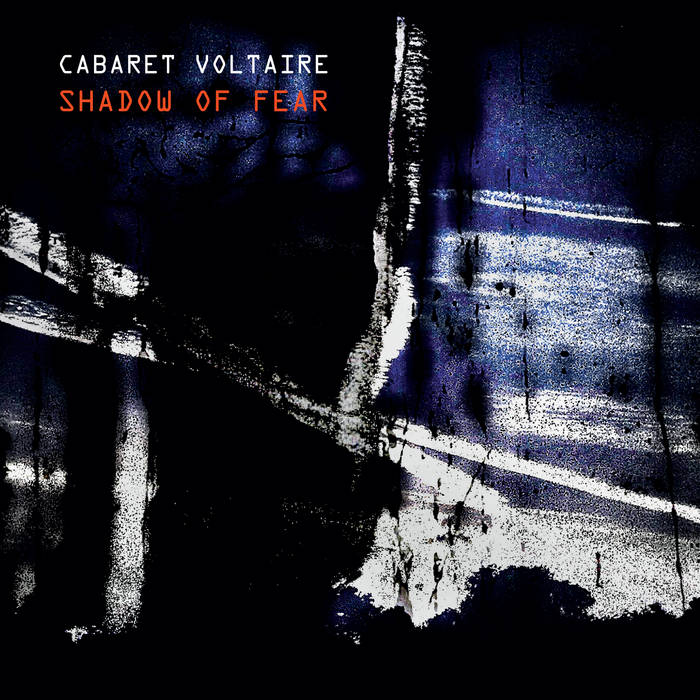
“I am really pleased to see this at the top spot as I found it to be a tremendously strong release, on par with their classic work, despite it being down to just a single original member. I was initially worried putting something to the legendary name, but this is worthy of the name, a work that retained the CV magic and ended up being a perfect addition to their catalog. Despite the year, I still expect to hear many of these tracks appear as dancefloor staples.” - Eve McGivern
"I still have somewhat mixed feelings about this one. I certianly enjoyed it, but it is hard not to feel like opting to use the CV name instead of one of Kirk's multiple aliases was a bit of a marketing ploy. Which, certainly did work given its ranking here. Although I think it is somewhat justified given there were some obvious usages of old school CV drum machines and other elements that drew a clear line to the band's history. I dug it, I just wish Stephen Mallinder was on it as well." - Creaig Dunton
"Excellent album. Richard H. Kirk has been releasing music under any name he so desires as long as he has made music and if he didn't feel it was a Cabaret Voltaire album, he wouldn't have released it as Cabaret Voltaire. In the grand trajectory of CV, it doesn't sound far off from the last new music released as CV back in 1994." - Jon Whitney - Einstürzende Neubauten, "Alles In Allem" (Potomak)
“I knew this would certainly be up there, considering our readership and the long gap between releases.” - Eve McGivern
"The more I listen, the more I love this album. It's a slow burner." - Jon Whitney - William Basinski, "Lamentations" (Temporary Residence)
"Quite an unusual release by Basinski standards (shorter pieces, operatic elements, etc.), but quite an inspired one as well. The achingly beautiful 'Please, This Shit Has Got to Stop' absolutely floored me." - Anthony D'Amico
"Certainly the most 'pop' of his solo albums, the shorter pieces don't make it any less powerful, however." - Jon Whitney - Anna von Hausswolf, "All Thoughts Fly" (Southern Lord)
"I understand how important technicality is to a composer and performer—the album was recorded on the largest pipe organ of its unique tuning using very particular recording equipment, etc,—but technicality can't match the power of the composition of a song itself. Recorded in January of 2020, nobody could foresee the toll on humanity COVID19 was going to take, but released in September, there was no way to escape the feelings of sorrow and despair the world was experiencing by then. I assume this album resonated with so many listeners because it felt like it was there at a time many of us needed to grieve and mourn all of the loss and come to terms with the pain. That pipe organ brought us to a place we couldn't be and shared an experience, if only in listening, amongst others." - Jon Whitney - Drew McDowall, "Agalma" (Dais)
- Mary Lattimore, "Silver Ladders" (Ghostly International)
"I'm delighted to see that this near the top of the chart, as there is often a very significant gulf between my own favorite albums and the poll results. 'Til a Mermaid Drags You Under' is easily one of the most gorgeous pieces that anyone released in 2020." - Anthony D'Amico
"Aided by Neil Halstead, this is a magical album: bringing a tantalizing sense of flowers, forests, the sea, and planes taking off, into our more interior 2020 worlds." - Duncan Edwards - Ian William Craig, "Red Sun Through Smoke" (130701)
"In hindsight, this was probably the most unintentionally prescient album of 2020: tender, intimate vignettes of quiet beauty composed in isolation while surrounded by fire, death, and heartache." - Anthony D'Amico - KMRU, "Peel" (Editions Mego)
"This was probably the year's most pleasant surprise for me. I thought I was completely burned out on ambient/drone, but I fell totally in love with this album before I even got to the end of the epic opener 'Why Are You Here.' A truly sublime and beautiful album from start to finish." -Anthony D'Amico - MJ Guider, "Sour Cherry Bell" (Kranky)
"I had never heard of MJ Guider before this release, and what an amazing introduction. This album became a favorite of 2020 for me." - Eve McGivern
- Clarice Jensen, "The experience of repetition as death" (130701)
"I had incredibly high expectations for this album after 2018's stellar For This From That Will Be Filled, but I was still floored by most of this release anyway. 'Final' still kills me absolutely every time I hear it." - Anthony D'Amico - Wire, "Mind Hive" (Pink Flag)
"I'm not sure Wire can do any wrong. Everything they do is magic. It's refreshing to see longstanding legends Wire continuing to release such powerful music." -Eve McGivern
"Wire without Bruce Gilbert is probably my least favorite era of the band. That does not mean I dislike it per se, it just is not the same without the tension between him and Colin Newman. I would say this is probably their strongest record in this phase, however." - Creaig Dunton - Ana Roxanne, "Because of a Flower" (kranky)
"An intimate and stunning recording, in which the balance of fragility and strength is perfect. Maybe that's (part of) the point. The album encourages such concentrated listening that when a guitar appeared I nearly fell over." -Duncan Edwards
"Such a powerful and personal statement, I'm disappointed this hasn't been appearing on many other year end lists, but as other publications start writing their year-end lists in November I shouldn't be surprised." - Jon Whitney - Autechre, "Sign" (Warp)
"Like everyone else, I liked the first few Autechre albums a lot, but I could never understand how they somehow became revered as the gold standard of electronic music as their later releases became increasingly obtuse affairs that felt like they could have been composed by AI. I'm still perplexed, mind you, but something finally clicked for me with Sign & Plus and I now appreciate Autechre the way I would appreciate an ambitiously impractical and futuristic-looking building." - Anthony D'Amico - Alva Noto, "Xerrox, Vol. 4" (Noton)
- Nurse With Wound, "Barren" (ICR)
"It's wild how stealthily NWW managed to transform into something akin to an extremely professional-sounding Fenn O'Berg-style supergroup. The conspicuous absence of Stapleton's more whimsical & mischievous eccentricities is certainly felt, but this album captures some impressively absorbing and focused performances. I like this phase! It's a shame Stapleton already burned through Space Music & Trippin' Musik as titles, because this is some prime deep-psych/heavy drone." -Anthony D'Amico - Matt Elliott, "Farewell To All We Know" (Ici d'ailleurs)
"Wow was this terrifyingly predictable." - Jon Whitney - FACS, "Void Moments" (Trouble In Mind)
"The winning album title for 2020. Raw power captured on vinyl." -Eve McGivern
- Black To Comm, "Oocyte Oil & Stolen Androgens" (Thrill Jockey)
"This was some of the most surreal music I listened to in 2020." -Eve McGivern
"Between Black to Comm and Mouchoir Etanche, Marc Richter somehow managed to release three wonderfully immersive and hallucinatory full lengths in single year. This was probably the best of them, but all three had some legitimately wonderful pieces." -Anthony D'Amico - The Necks, "Three" (Northern Spy)
- Sarah Davachi, "Cantus, Descant" (Late Music)
"I could not keep up with the impressive flood of new Sarah Davachi music this year, but both this album and its companion (Figures in Open Air) featured some characteristically sublime and heavenly pieces." -Anthony D'Amico - Ak'chamel, The Giver of Illness, "The Totemist" (Akuphone)
"I'm delighted to see such a deeply weird project do so well in the poll. It is heartening to see deserving fringe-dwellers celebrated in something that so often feels like a popularity contest." -Anthony D'Amico - Richard Skelton, "These Charms May Be Sung Over A Wound" (Phantom Limb)
"I don't think I have ever been disappointed by a major new Richard Skelton release, but I definitely preferred the warmer first half of this one to the colder, more gnarled second half. The slow-burning beauty of 'For Either Deadened or Undeadened' easily ranks among Skelton's finest work." -Anthony D'Amico - Beatriz Ferreyra, "Echos +" (Room40)
- Windy & Carl, "Allegiance and Conviction" (Kranky)
"Easily one of my top choices of the year." - Jon Whitney - Jesu, "Terminus" (Avalanche)
"I think this may be the best release of the more recent Jesu work. Not overly electronic, but not metal enough to infringe on Justin Broadrick's Godflesh work, it stands strongly on its own. It also features the clearest evidence of Broadrick's post-punk influences, with some of these songs recalling the Cure's earliest (and best) material." - Creaig Dunton - Sarah Davachi, "Figures In Open Air" (Late Music)
- Belbury Poly, "The Gone Away" (Ghost Box)
- Bohren & der Club of Gore, "Patchouli Blue" (Ipecac)
- Sparkle Division, "To Feel Embraced" (Temporary Residence)
- Autechre, "Plus" (Warp)
- Gnod & João Pais Filipe, "Faca de Fogo" (Rocket)
"Filipe's powerful percussive rhthyms added a deeply tribal feel to the tripped out Gnod sounds. It is indeed great, but found it surprising it ranked as high as it did. Praise Gnod." -Eve McGivern - Andrew Chalk, "Incidental Music" (Faraway Press)
"Collecting Andrew Chalk music has historically been difficult on the wallet but fortunately with Bandcamp, however Incidental Music is easily more essential than incidental." - Jon Whitney - Noveller, "Arrow" (Ba Da Bing!)
"Not a bad ranking for this one, but not truly indicative of one of the most gorgeous releases of 2020." - Eve McGivern
"I have no grievance with this album, but I was surprised that it did not feature at least one song that instantly struck me as impossibly great, given Sarah Lipstate's stellar track record in that regard. I guess she was in 'album mode' rather than 'single mode' this time around." -Anthony D'Amico - Current 93, "If A Star Turns Into Ashes" (The Spheres)
- Edward Ka-Spel, "Angel Trombones" ([self-released])
- Lawrence English, "Lassitude" (Room40)
- Less Bells, "Mourning Jewelry" (Kranky)
- Félicia Atkinson, "Everything evaporate" (Shelter Press)
"Atkinson just keeps quietly releasing one fascinating album after another. This one felt like a portal into a mysterious subconscious oasis of floating memory fragments. Also, 'Don't Assume' is wonderfully creepy and unsettling." -Anthony D'Amico - OOIOO, "Nijimusi" (Thrill Jockey)
- CS + Kreme, "Snoopy" (The Trilogy Tapes)
- Daniel Avery & Alessandro Cortini, "Illusion Of Time" (Phantasy Sound / Mute)
- Beatriz Ferreyra, "Huellas Entreveradas" (Persistence of Sound)
- Matmos, "The Consuming Flame" (Thrill Jockey)
- Four Tet, "Sixteen Oceans" (Text)
"Another gorgeous entry into the Four Tet catalog. A shining achievement." - Eve McGivern - Bob Mould, "Blue Hearts" (Merge)
"Another album that fit right in with all the anger and pain 2020 gave us." - Jon Whitney
"Another album that deserved to be ranked higher in the list. An absolutely soul-bearing raw rock statement." -Eve McGivern - Jasmine Guffond, "Microphone Permission" (Editions Mego)
- Magik Markers, "2020" (Drag City)
- Juliana Barwick, "Healing is a Miracle" (Ninja Tune)
- Christina Vantzou, "Multi Natural" (Edições CN)
- Joseph Allred, "The True Light" (Meliphoric)
"If there was any benefit to a miserable year of lock down, it was the volume of beautiful music that came from the insanely prolific and talented Joseph Allred's fingers. - The Soft Pink Truth, "Shall We Go On Sinning So That Grace May Increase?" (Thrill Jockey)
"The standout of several albums from 2020 which make me wish I still had a bath. In fact, I don't even need a bath to luxuriate in the warmth of this embrace. Descriptors such as "ambient' or "minimal" and "house" are apt, but the choices of instrumentation and the subtle variety of flickering and enveloping textures make this a healing, almost rebirthing, experience." - Duncan Edwards - Sarah Davachi, "Five Cadences" ([self-released])
- Actress, "Karma & Desire" (Ninja Tune)
"The full album did not leave a particularly deep impression on me, but it probably would have been among my favorites of the year if every song had been like 'Angels Pharmacy.'" -Anthony D'Amico - Franck Vigroux, "Ballades sur lac gelé" (Raster)
- X, "Alphabetland" (Fat Possum)
"Another perfect angry rock album that 2020 begged for." - Jon Whitney
"Perfect for the year that was." -Eve McGivern - Monolake, "Archaeopteryx" (Imbalance Computer Music)
- Jim White and Marisa Anderson, "Jim White and Marisa Anderson" (Thrill Jockey)
- Laraaji, "Moon Piano" (All Saints)
- Laraaji, "Sun Piano" (All Saints)
"A pleasant and unexpected turn, I first thought Sun Piano was going to be part of the Sun-themed releases over the last few years, however it began an entirely new and marvelous piano trilogy which ended with the EP Through Luminous Eyes." - Jon Whitney - Regis, "Hidden In This Is The Light That You Miss" (Downwards)
- Soft Kill, "Dead Kids, R.I.P. City" (Cercle Social)
"My most played rock album of 2020." - Jon Whitney
"What an incredible slab of classic post-punk sound." -Eve McGivern - Joseph Allred, "On Whatever Ground" (Meliphoric)
- JK Flesh vs Echologist, "Echology Vol 1" ([self-released])
- Teleplasmiste, "To Kiss Earth Goodbye" (House of Mythology)
- David Toop, "Apparition Paintings" (Room40)
- Sarah Davachi, "Gathers" (Boomkat Editions)
- Jim O'Rourke, "Shutting Down Here" (SN Variations)
- The Psychedelic Furs, "Made of Rain" (Cooking Vinyl)
- JK Flesh, "Depersonalization" (Hospital)
- Richard Skelton, "Lastglacialmaximum" (Corbel Stone Press)
- Pinkcourtesyphone, "Leaving Everything To Be Desired" (Room40)
- Rival Consoles, "Articulation" (Erased Tapes)
- Howard Stelzer, "Invariably Falling Forward, Into the Thickets of Closure" (No Rent)
"Three packed CDs of new material from one of the masters of contemporary cassette manipulation. Howie's work is always so varied and diverse, and this is no exception. Excellent set." - Creaig Dunton
"An epic album that I always knew Stelzer had in him. It is a truly remarkable piece of work." - Jon Whitney - Ulver, "Flowers of Evil" (House of Mythology)
- Black To Comm, "A C of M" (Cellule 75)
- Six Organs of Admittance, "Companion Rises" (Drag City)
- Robert Haigh, "Black Sarabande" (Unseen Worlds)
"Given the subject matter, this is an appropriately slightly harder-edged and darker recording than Haigh's "Creatures of The Deep" but every bit as precise and mournful." - Duncan Edwards - Big Blood, "Do You Wanna Have a Skeleton Dream?" (Feeding Tube)
"Big Blood made their formal debut as a trio with an entertainingly eccentric homage to '60s 'girl groups.' I did not love this album quite as much as their usual oft-brilliant fare, but it is certainly a fun one-off. And 'Heaven or South Portland' probably would have been a highlight on any Big Blood album. Consistently one of the most compelling projects around, as far as I am concerned." - Anthony D’Amico
"They're like a hit factory from a parallel universe." - Jon Whitney - Midwife, "Forever" (The Flenser)
"WHY IS THIS SO GODDAMN FAR DOWN THE LIST?!?!" (hurls computer out window, starts smashing all the furniture in the room) -Anthony D'Amico
"I don't get it either, this is one of my top listened to albums of the year too." - Jon Whitney - Clipping, "Visions of Bodies Being Burned" (Sub Pop)
"I came to know the beast that is clipping. late in the game this year. This amazing blend of genres won me over, expanded my musical circle, and drove me to seek out the rest of their catalog. Incredible output year after year, I hope their musical reach expands to a wider audience." -Eve McGivern
- Okkyung Lee, "Yeo-Neun" (Shelter Press)
"A solid balance of traditional form and creative exploration gives this music the airy balance and restrained power found in chamber music. On this form I'd trust Okkyung Lee with a scalpel, never mind a cello bow." -Duncan Edwards - A Certain Ratio, "ACR Loco" (Mute)
- Morphology, "Horta Proxima" (FireScope)
- CV & JAB, "Landscape Architecture" (self released)
- Golden Retriever and Chuck Johnson, "Rain Shadow" (Thrill Jockey)
- Vladislav Delay, "Rakka" (Cosmo Rhythmatic)
- Joseph Allred, "Traveler" (Feeding Tube)
- KMRU, "Saal" ([self-released])
- Mint Field, "Sentimiento Mundial" (Felte)
- Tara Jane O'Neil, "Songs for Peacock" (Orindal)
- Throwing Muses, "Sun Racket" (Fire)
- Wrangler, "A Situation" (Bella Union)
- Helen Money, "Atomic" (Thrill Jockey)
- TALsounds, "Acquiesce" (NNA Tapes)
"One of my top choices for album of the year, it's a fantastic album." - Jon Whitney - Protomartyr, "Ultimate Succes Today" (Domino)
- Ben Chatwin, "The Hum" (Village Green)
- Sir Richard Bishop, "Oneiric Formulary" (Drag City)
- Eleh, "Home Age" (Important)
- Jeff Parker, "Suite for Max Brown" (International Anthem)
"For this tribute to his mother, Parker conjures a great balance of drum loops and guitar improvisation. A blend of machine and human elements which avoids over-sentimentality but retains love. - Duncan Edwards - Simon Scott, "Apart" (12k)
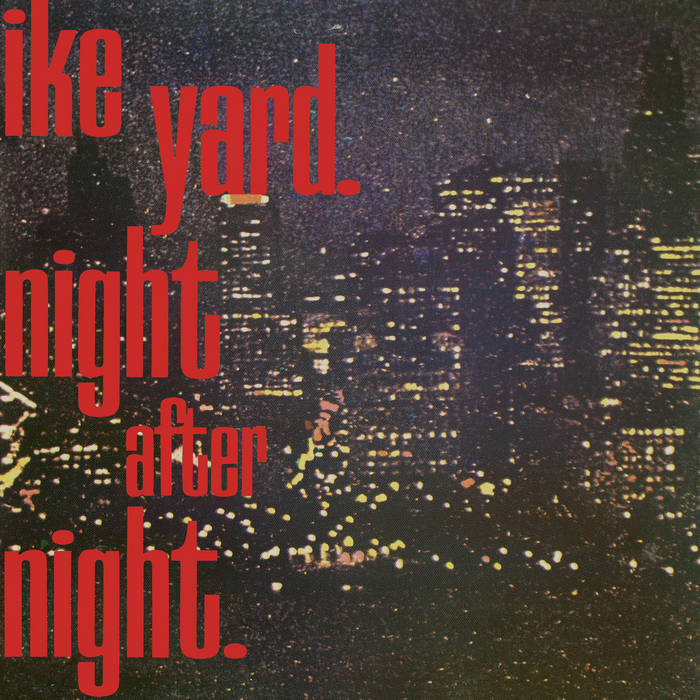
Single of the Year
- Ike Yard, "Night After Night" (Superior Viaduct)
“Not quite as revelatory as the LP that was also reissued this year, but still cool as hell. And—unlike the LP—this release was largely unheard before its reissue. My six-year-old self really should have been much more focused on hunting down Belgian import vinyl in 1981." - Anthony D'Amico - The Legendary Pink Dots, "The Legendary Pink Dots Hallowe'en Special 2020" ([self-released])
- Edward Ka-Spel, "Splendid Isolation (Day 1)" ([self-released])
- Edward Ka-Spel, "Splendid Isolation Chapter 2" ([self-released])
- Jesu, "Never" (Avalanche)
"This one was a bit hit and miss for me, and some of it overlaps heavily with the Pale Sketcher vibe (although I am not sure if that project is dead or not). Good, but Terminus was the winner." - Creaig Dunton - Alva Noto, "A Forest" (Noton)
- Panasonic, "Zoviet France / Muslimgauze remixes" (Sähkö)
- Four Tet, "Baby" (Text)
- Laraaji, "Through Luminous Eyes" (All Saints)
- Klara Lewis, "Ingrid" (Editions Mego)
"I've always found Lewis's work compelling, but this EP still totally blindsided me. Smoldering, eerie, and mesmerizing perfection." -Anthony D'Amico - Pye Corner Audio, "Where Things Are Hollow 2" (Lapsus)
- Future Museums, "Leaving the Vessel" (Holodeck)
- Michael C. Sharp, "Motor Pt. 2: White Lines" (Holodeck)
- Public Memory, "Illusion of Choice" (felte)
"I was sad to see Ripped Apparition didn't make the top 100 in the list, but am happy the Single of the Year category. Robert Toher continues to create gorgeous ethereal works in any of his incarnations." - Eve McGivern - Angel Bat Dawid, "Transition East" (International Anthem)
- SPC ECO, "11月EP November EP" ([self-released])
- Mary Lattimore, "Hold Your Breath" ([self-released])
- Mary Lattimore, "We Wave From Our Boats" ([self-released])
- Big Joanie, "Cranes in the Sky b/w It's You" (Third Man)
- KMRU, "Drawing Water" ([self-released])
- Craven Faults, "Enclosures" (Leaf)
- HTRK, "ヾ(⌐■_■)ノ♪ *・゚✧ ✧゚*ヽReal Headfuck ♪ *♪ Reverse Déjà Vu *:・゚" ([self-released])
- Celer, "As It Grows, It Dies" (Two Acorns)
- Celer, "Up Here Without You" (Two Acorns)
- Marisa Anderson & Tara Jane O'Neil, "You'd Be So Nice To Come Home To" (Jealous Butcher)
Vault/Reissue of the Year
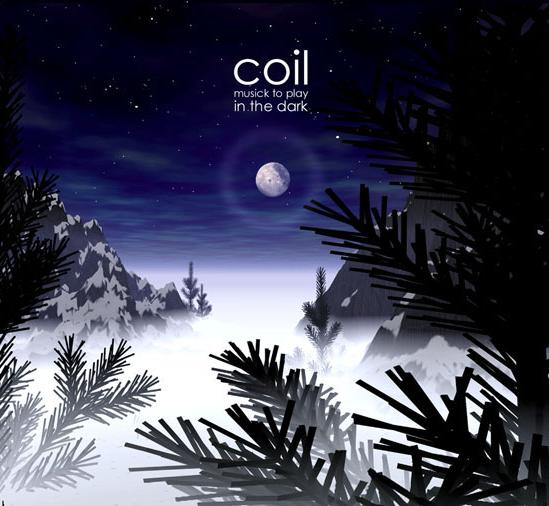
- Coil, "Musick to Play in the Dark, Vol. 1" (Dais)
- Swans, "Children of God" (Young God)
- Current 93, "Sleep Has His House" (House of Mythology)
- Nurse With Wound, "Rock 'N Roll Station" (Abstrakce)
- Nurse With Wound, "To the Quiet Men from the Tiny Girl" (United Dirter)
- Nurse With Wound, "Merzbild Schwet" (United Dirter)
"Examples of perfect reissues: faithfully restored artwork, no additional gimmicky new label logos, replica inserts, and excellent sound." - Jon Whitney - Ike Yard, "Ike Yard" (Superior Viaduct)
"Now that I have listened to this album a lot, I believe a strong case could be made that Ike Yard may have secretly been the best band on Factory Records. I'd personally still give Joy Division/New Order the edge (better songs), but Ike Yard were inarguably years ahead of all their peers in terms of sheer vision. This is a legitimate classic." - Anthony D'Amico
"^^^ What he said." - Eve McGivern - Diamanda Galás, "The Litanies of Satan" (Intravenal Sound Operations)
- Coil, "Astral Disaster Sessions Un/Finished Musics Vol. 2" (Prescription)
- Current 93, "Horsey" (House of Mythology)
- Loscil, "coast/ range/ arc//" (Kranky)
- The Legendary Pink Dots, "Kleine Krieg" (Klanggalerie)
- Wire, "10:20" (Pink Flag)
"The first half, previously released on the limited Strays EP was strong to begin with, but the additional four songs are excellent in their own right. 'Art of Persistance' was great to begin with on one of those ultra-limited 2000 reform era releases, and I was pleasantly shocked to hear Manscape represented in a reworked 'Small Black Reptile.'" -Creaig Dunton - Bourbonese Qualk, "Hope" (Klanggalerie)
"I sincerely doubt reissuing Bourbonese Qualk albums is a lucrative endeavor, but I am thrilled that Klanggalerie is doing it. Such an intermittently fascinating and underappreciated project. Their discography is definitely a wildly uneven one, but there are a plenty of gems lurking in it for those inclined to dig. I can easily think of several revered post-punk bands that were far less adventurous and compelling than these guys." -Anthony D'Amico - The Legendary Pink Dots, "Festive 2" ([self-released])
- Nurse With Wound, "Trippin' Musik" (United Dirter)
- Mirror, "Some Days It Rains All Night" (La Scie Dorée)
- Pale Saints, "The Comforts Of Madness 30th Anniversary Re:Masters" (4AD)
- Pale Saints, "Mrs. Dolphin" (4AD)
- Panasonic, "Zoviet France / Muslimgauze remixes" (Sähkö)
- Tod Dockstader, "Aerial #1" (Important)
- Windy & Carl, "Unreleased Recordings 1992-1995" (Blue Flea)
- Big Blood, "Dark Country Magic" (Feeding Tube/Cardinal Fuzz)
- Valium Aggelein, "Black Moon" (Numero Group)
- Stephen Mallinder, "Pow Wow" (Suction)
Various Artist Compilation of the Year
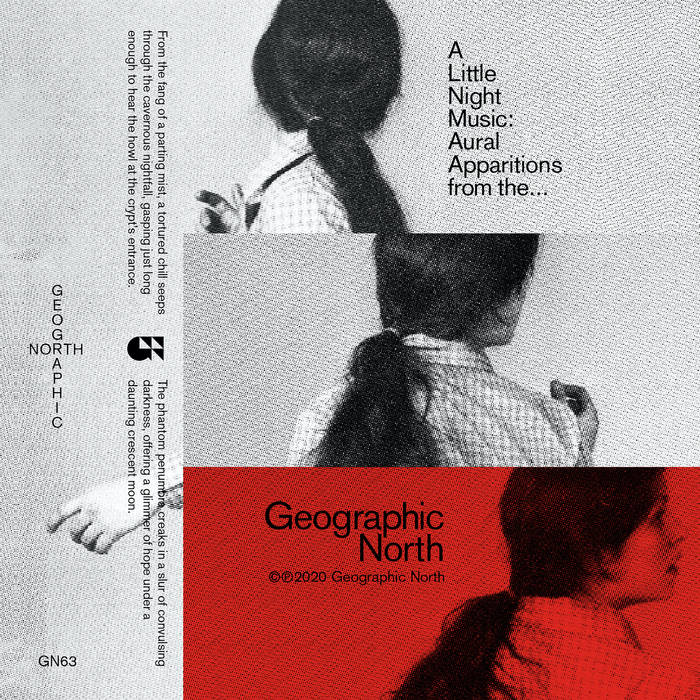
- "A Little Night Music: Aural Apparitions from the Geographic North" (Geographic North)
"Geographic North put so much (fiendish) care and (diabolical) thought into curating and sequencing their Halloween albums. I am not at all surprised that this is at the top." - Anthony D'Amico - "Deutsche Elektronische Musik 4: Experimental German Rock And Electronic Music 1971 - 1983" (Soul Jazz)
"A fantastic series that continues to mine German rock and electronic history, perfect for musical purveyors of all knowledge levels, a perfect mix of both well-known and more obscure artists." - Eve McGivern - "Love In The Time Of Covid" (Veni Versus)
- "From Brussels with Love" (Les Disques Du Crépuscule)
"A worthy reissue of a classic compilation." - Eve McGivern - "Anthology of Persian Experimental Music Vol. II" (Unexplained Sounds Group)
- "Decima Circuits_Cottage Industries 10" (Neo Ouija)
- "Anthology of Contemporary Music From Indonesia" (Unexplained Sounds Group)
- "Anthology of Experimental Music from Mexico" (Unexplained Sounds Group)
- "Anthology of Post Industrial Music From Balkan Region" (Unexplained Sounds Group)
"Unexplained Sounds Group continue to astound me, putting out stellar material that breaks musical and cultural boundaries. I can't wait to see what they do for 2021." - Eve McGivern - "Call Me Old Fashioned" (Numero Group)
- "Eccentric Soul: The Renfro Label" (Numero Group)
- "Lost & Found Vol. 1" (Dark Entries)
- "Maghreb K7 Club: Synth Raï, Chaoui & Staifi 1985 - 1997" (Sofa / Les Disques Bongo Joe)
"My roommate turned me onto this, and I have to say it was a delight." - Eve McGivern - "Vanity Box I" (Kyou)
"Good luck getting your hands on one of these!" - Jon Whitney - "Eilean 100" (Eilean)
"A wonderful swan song for a great label. Almost every time I listen to this, I find a new album that I simultaneously want immediately and feel like a total chump for sleeping on." -Anthony D'Amico - "Brown Acid - The Eleventh Trip" (Ridingeasy)
- "Interstellar Funk Presents Artificial Dancers: Waves Of Synth" (Rush Hour)
- "Pop Ambient 2021" (Kompakt)
- "Mogadisco: Dancing Mogadishu, 1974–1991" (Analog Africa)
"I feel like a goddamn broken record saying the same thing every year, but I'll say it again: every single Analog Africa compilation in recent memory has been an absolute delight." -Anthony D'Amico - "Pirate's Choice 2" (Studio One/Yep Roc/Rock a Shacka)
"I was not really expecting a second volume, given that it has been roughly forty years since the first one dropped, so this was quite a pleasant surprise. Pretty sure I will spend my entire life constantly finding classic Studio One songs that I didn't know existed." -Anthony D'Amico - "Particle Count" (Room40)
- "Psi-Solation - A Global Compilation Of Music Made In Lockdown" (Celebrate Psi Phenomenon)
- "A Bloxham Christmas" (Bloxham Tapes)
- "Going to Georgia" (Merge)
- "Tokyo Dreaming" (We Want Sounds)
Boxed Set of the Year
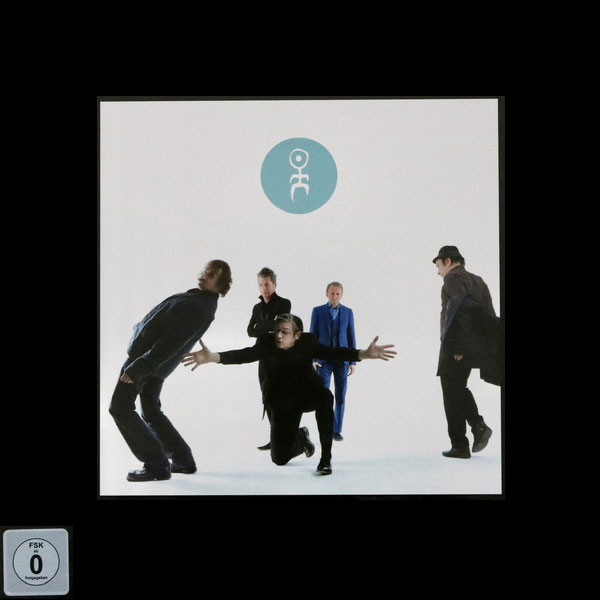
- Einstürzende Neubauten, "Phase IV: The Box Set" (Potomak)
- Zoviet France, "Châsse 2ᵉ" (Vinyl-on-Demand)
"Predictably, I frantically ordered this as soon as it was announced, but still haven't listened to it because I am rarely near my record player and I have been regularly listening to most of these albums for like twenty years already. I'm damn glad that this exists, but I mostly just want all the good Zoviet France albums to be widely available and affordable." - Anthony D'Amico - African Head Charge, "Drumming Is A Language 1990 - 2011" (On-U Sound)
- No Trend, "Teen Love / Too Many Humans" (Drag City)
- Sun Ra, "Egypt 1971" (Strut)
- Gang of Four, "77-81" (Matador)
- Robbie Basho, "Song of the Avatars: The Lost Master Tapes" (Tompkins Square)
- Global Communication, "Transmissions" (Evolution)
- The Residents, "Cube-E: The History Of American Music In 3 E-Z Pieces" (Cryptic Corporation)
- Celer, "Future Predictions" (Two Acorns)
"As someone who very much appreciates the hypnotic beauty of a perfectly crafted loop, I played this album to death this year. Definitely one of my favorite Celer releases ever." -Anthony D'Amico - King Crimson, "The Complete 1969 Recordings" (Discipline Global Mobile)
"Already having the 40th Anniversary boxed edition of In the Court of the Crimson King, did I really need this as well? Nope. Did I still buy it? Yep." - Creaig Dunton - The Magnetic Fields, "Quickies" (Merge)
- Bob Mould, "Distortion: 1989-2019" (Edsel)
- Loop, "Sevens" (Reactor)
- Pole, "1 2 2003" (Mute)
- Pylon, "Box" (New West)
- The Primitives, "Bloom! The Full Story 1985-1992" (Cherry Red)
- Claudio Simonetti, "Demons (Original Soundtrack) - 35th Anniversary" (Rustblade)
- [V/A], "Vanity Box I" (Kyou)
- øjeRum, "Nothing Is Meant To Be" (Art Into Life)
- Michael Rother, "Solo II" (Grönland)
- Ulrich Schnauss, "Now Is A Timeless Present - A Retrospective" (Scripted Realities)
- Merzbow, "Laptop Noise" (Slowdown)
- Merzbow, "Dadarottenvator" (Urashima)
- Merzbow, "Go Vegan" (Slowdown)
Artist of the Year

- Edward Ka-Spel
"Isolation and lockdown kept EKS insanely prolific with some of the best releases this year." - Jon Whitney - SPC ECO
"Another example of a prolific act during lockdown and isolation, the duo of Dean Garcia (formerly of Curve) and Rose Berlin issued EPs on the first of every month with the exception of one LP and another soundtrack. Perhaps it wasn't popular enough to chart with the readers but the volume of material was sufficient enough to earn the numeric at to this point." - Jon Whitney - KMRU
- Sarah Davachi
- Joseph Allred
- Mary Lattimore
- Einstürzende Neubauten
- Celer
- The Legendary Pink Dots
- Cabaret Voltaire
Label of the Year
- Thrill Jockey
- Kranky
- Editions Mego
- Room40
- Dais
- Drag City
- House of Mythology
- Mute
- United Dirter
- Superior Viaduct
New Artist of the Year
KMRU

"Although technically his debut EP was self-released in 2019, 2020 was notably the breakthrough year Nairobi-born sound artist/DJ/producer Joseph Kamaru. Currently resising in Berlin, he released three excellent full-length LPs on the Editions Mego, Seil, and Dagoretti labels as well as an astounding amount of self-issued music through his own Bandcamp site. Much of it is currently available at a name-your-price feature and is well-deserving of the attention." - Jon Whitney
Lifetime Achievement Recognition
Cabaret Voltaire
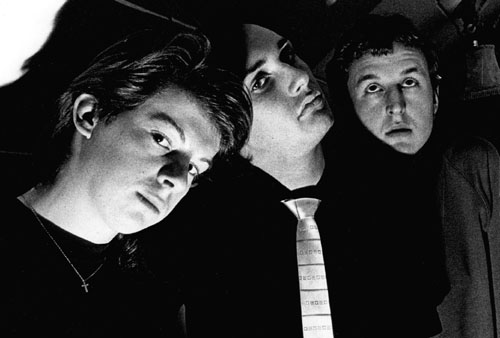
"While the name Cabaret Voltaire is currently only in use by Richard H. Kirk, all three original members continue to have a significant effect on music over four decades after they began. Stephen Mallinder remains quite active with solo releases while being a current member of the groups Wrangler and Creep Show while Chris Watson, also with an active career as a solo artist, is one of the world's leading recorders of wildlife and nature, and has received multiple awards for his sound work." - Jon Whitney
"Of those early bands that became synonymous with industrial music, Cabaret Voltaire had not only the longest, but also the most diverse career. From early electronic improvisations to bleak funk, then setting the foundation for EBM and ambient techno, their influence is unquestionable. Even into their solo careers, with Richard H. Kirk's seemingly infinite pseudonyms, Stephen Mallinder's work both in collaborations and alone, and Chris Watson's lauded field recordings and his early work as part of the Hafler Trio, all three continue to innovate. With Kirk's reactivation of the moniker and an excellent album in 2020, and promises of more to come, it is the perfect opportunity to recognize Cabaret Voltaire." - Creaig Dunton
"Cabaret Voltaire has had a significant impact on the outer reaches of electronic music for over 40 years, hugely influential to a vast swath of like-minded musicians, serving as a beacon to the far reaches of turntablism, field sounds, and tape manipulation. The individuals -- whether as Cabaret Voltaire, solo, or as part of a myriad of side projects -- have never shied away from conveying uneasy messages through these sound vehicles, and each member continues to practice their craft to this day. Each member had a release in 2020, with Cabaret Voltaire and Wrangler both in this year’s Brainwashed poll. With Shadow of Fear landing the top spot of Album of the Year, it stands as a vital testament to the rollercoaster of 2020, proof that Cabaret Voltaire’s sound messages continue to matter." - Eve McGivern
"Cabaret Voltaire and I got off to an extremely bad start, as my first exposure to them was an improbable haul of 'industrial tapes' I found at a flea market as a teen. As soon as I got home, I excitedly put a CV tape in my deck expecting something akin to Skinny Puppy, Throbbing Gristle, or Coil...and I got some kind of clunky electro-funk instead. I instantly decided that I intensely hated Cabaret Voltaire. My hostility was then rekindled a few years later when I lived with someone who would constantly play their early '90s techno albums. Then I heard The Conversation and 'Project 80' has been one of my favorite songs ever since. Unsurprisingly, I have since found several other great Cabaret Voltaire albums to enjoy, but their larger achievement lies in somehow being a ubiquitous presence in seemingly every phase of my personal musical evolution and how all three original members have continued to fitfully release compelling albums in various incarnations for more than four decades. I suppose there is some small element of nostalgia involved, but I still genuinely want to hear whatever Chris Watson, Richard Kirk, and Stephen Mallinder are up to in 2020. Sometimes I am admittedly disappointed, yet not a single member of that band has ever stopped being a viable creative force capable of releasing a legitimately good and relevant new album." - Anthony D'Amico
Honorable mentions:
Simeon
"Simeon was unquestionably one of the greatest (if woefully underappreciated) iconoclasts to emerge from an era that was absolutely teeming with radical ideas, radical culture, and iconic figures (the late '60s). Even now, the first Silver Apples albums still sound like they were made by an alien who had rock music explained to them with some EXTREMELY crucial details left out (what do you sing about? which instruments are acceptable?). And he built his own weird and complicated instrument to do it (he was totally the Rube Goldberg of the avant-garde). I also love that he managed to accidentally destroy his own band (and arguably their record label) by subversively putting a crashing plane on the back of an album that was bizarrely sponsored by Pan Am. Obviously, the aftermath of that was not great for anyone, but that does not make it any less punk as fuck (and years before punk even really existed). Plenty of artists can be reasonably described as singular or unique, yet Simeon was truly on another plane altogether, embarking an a strange and entirely new path that absolutely no one could possibly follow (though still inspiring plenty of other great artists along the way). I definitely wish the Silver Apples story had been a happier one, but Simeon was (and is) a true outsider hero." - Anthony D'Amico
"It seems medically impossible (or at least improbable) that a human who suffered as many electric shocks from his own engeineered gear continued to be a creative force well into his 80s. On top of the legendary recordings that continue to sound fresh and have a resounding influence over a half century later, he was an absolutely wonderful gentleman and a pleasure to work with and see perform." - Jon Whitney
Harold Budd
"If someone wrote Harold Budd's life story as the plot of a novel or a film script, it would seem so crazily improbable that it would be rejected instantly: he started as a drummer...then got drafted and wound up in an army band with Albert Ayler...then he was briefly a cowboy...then he went to a community college for architecture until a teacher talked him into studying music...then he started teaching at CalArts...then became a significant figure in the LA avant-garde scene...and then decided that none of it was for him at all and abandoned composing altogether.
A few years later, he started writing music in a completely different vein, Gavin Bryars fatefully shared one of those newer compositions with Brian Eno, and a life-changing collaboration was born. I played those Budd/Eno albums quite a lot in my twenties and I still think they are great, yet Budd's life and trajectory amount to much more than a handful of beloved albums. Few artists have even a fraction of Budd's integrity, persistence, and vision, as he walked away from quite a promising life to focus for decades on making gentle, impressionistic piano music that went completely against the cultural tide (and basically pioneered a new playing technique to do it). He may have departed the physical realm this year, but he remains a legitimately inspiring figure (and his work remains instantly recognizable, which is no small feat for a pianist)." - Anthony D'Amico
Read More
- Anthony D'Amico
- Albums and Singles
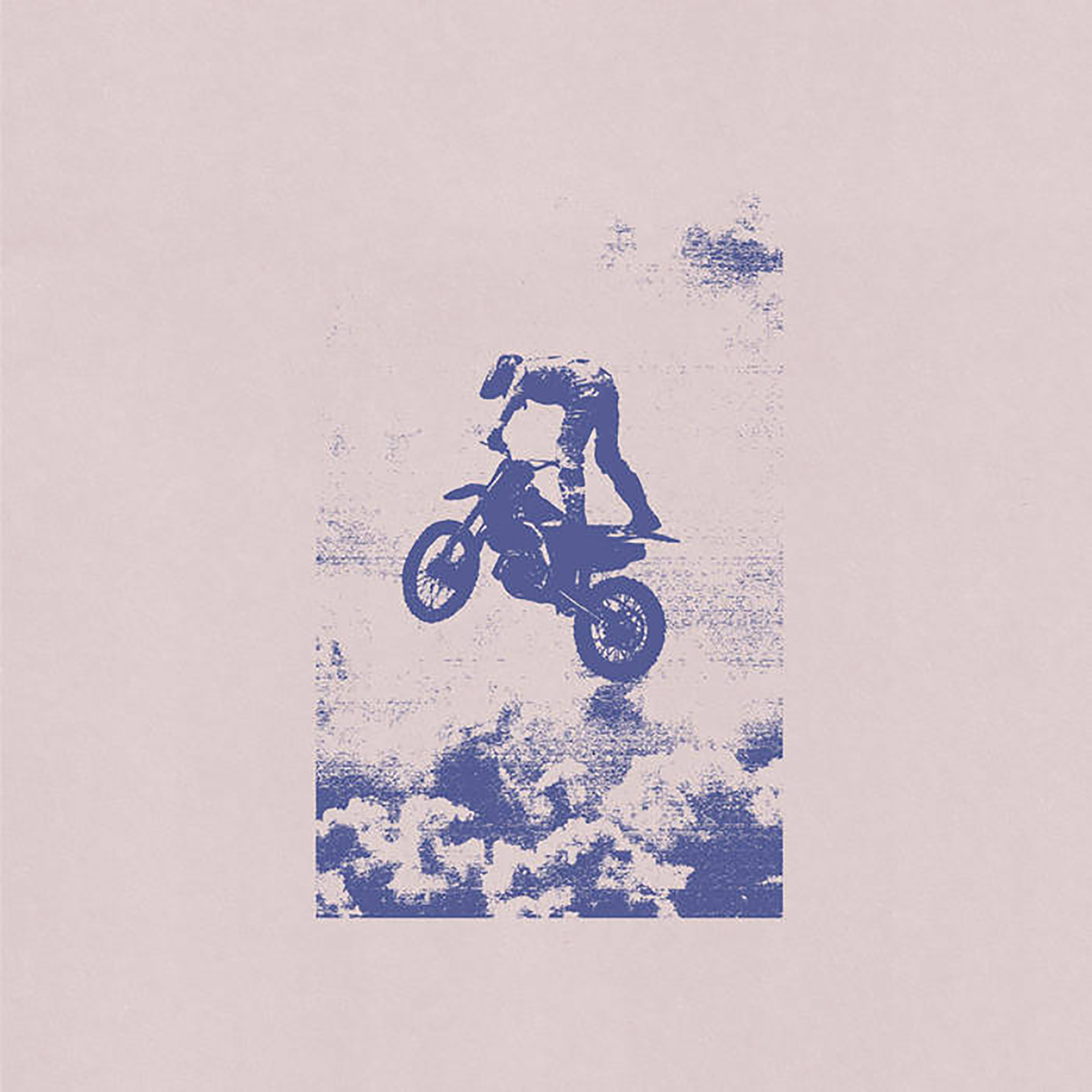 This is the debut album from a "network of New England string pluckers, organ drivers and bell ringers" centered around composer/pedal steel guitarist Henry Birdsey. This is my first real encounter with Birdsey's work, though I was vaguely aware of his duo Tongue Depressor with Crazy Doberman's Zach Rowdan. While I do not get the usual otherworldly "Just Intonation" vibe from Country Tropics' buzzing and layered harmonies, unconventional tunings have historically been a central theme in Birdsey's work, so that may be an element here too. Then again, Old Saw seems like a very different project than Birdsey's usual fare in one very significant way, as Country Tropics is billed as a unique strain of devotional music. I believe it is a secular one, however, as the album description claims "Old Saw points our gaze downward towards the terrafirma unconsidered, and guides our hands into the dirt" rather than towards a "fantastical, celestial vision of understanding." Regardless of their inspirations, Old Saw is an ensemble like no other, approximating a rustic drone or free folk ensemble like Pelt or Vibracathedral Orchestra in an especially warm and transcendent mood (albeit not so warm and transcendent as to preclude some welcome sharp edges, shadows of dissonance, and heavy buzzing strings). This is quite an excellent and unique album.
This is the debut album from a "network of New England string pluckers, organ drivers and bell ringers" centered around composer/pedal steel guitarist Henry Birdsey. This is my first real encounter with Birdsey's work, though I was vaguely aware of his duo Tongue Depressor with Crazy Doberman's Zach Rowdan. While I do not get the usual otherworldly "Just Intonation" vibe from Country Tropics' buzzing and layered harmonies, unconventional tunings have historically been a central theme in Birdsey's work, so that may be an element here too. Then again, Old Saw seems like a very different project than Birdsey's usual fare in one very significant way, as Country Tropics is billed as a unique strain of devotional music. I believe it is a secular one, however, as the album description claims "Old Saw points our gaze downward towards the terrafirma unconsidered, and guides our hands into the dirt" rather than towards a "fantastical, celestial vision of understanding." Regardless of their inspirations, Old Saw is an ensemble like no other, approximating a rustic drone or free folk ensemble like Pelt or Vibracathedral Orchestra in an especially warm and transcendent mood (albeit not so warm and transcendent as to preclude some welcome sharp edges, shadows of dissonance, and heavy buzzing strings). This is quite an excellent and unique album.
Aside from the strangely beautiful and poetic cover art of a dirt bike soaring over the clouds, Country Tropics is the sort of album that could easily be mistaken for an old private press release from a rural religious commune. I would definitely find it challenging to guess where that commune was located, however, as the vibe feels like a quaint, historic small New England town was dropped onto a sundappled Pacific coast. Regardless of where that hypothetical commune is based, Old Saw seem to be channeling something beautiful and magical in a way that is quite singular, as these four drone reveries feel simultaneously dreamlike, homespun, and earthy. Knowing that Birdsey is a serious avant-garde composer helps explain how the album ultimately turned out so texturally compelling and languorously hallucinatory, but it also feels like he consciously set out to make something pure, semi-traditional, and organically collaborative. This is kind of a "best of both worlds" situation, as the compositions themselves are simple, beautiful, and devoid of self-conscious artiness, yet they definitely sound like they were ultimately produced by someone who knows how to craft richly textured and harmonically interesting sound art.
Each of the four pieces is quite lovely in its own way, but the first two feel like the most gorgeous incarnations of Old Saw's devotional dreamscapes of bygone Americana. I honestly do not know how the ensemble conjured the buzzing backing drones for the opening "Dead Creek Drawl," as none of the instruments I think I hear (shruti box, tampura) are listed in the credits, but it all certainly sounds great nonetheless. As the piece unfolds, however, the gently churning and buzzing acoustic drones are subtly enhanced with rippling banjo arpeggios, woozily sliding pedal steel, moaning strings, and fleeting glimpses of a very cool guitar motif. The piece has a very unhurried and meditative feel that suits it well, as I do not feel like Old Saw are headed toward a destination so much as fading in and out of focus from a place of sublime bliss that I am quite content to linger in. "The Mechanical Bull at Our Lady of the Valley" initially has a more propulsive feel due to Harper Reed's rapidly rippling nylon string arpeggios, but otherwise sticks to roughly the same territory as its predecessor until some inspired new elements creep into the reverie, as it feels like someone starts prying the top off a Pandora's Box of subtle and warm psych textures (flickers of backwards melodies, twinkling and clanging bells, etc.). The remaining two pieces are cut from roughly the same cloth, which is just fine by me, as the real magic of Country Tropics is that Old Saw manage to cast and sustain a mesmerizing and immersive spell of soulful, subtly hallucinatory tranquility for nearly forty minutes. This is a quiet and modest masterpiece—the kind of album that I wish I could live inside.
Samples can be found here.
Read More

